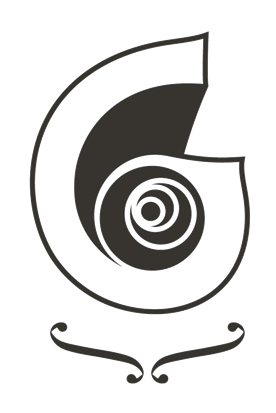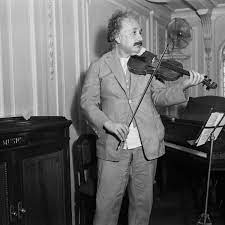In 1929, Albert Einstein told the Saturday Evening Post, “If I were not a physicist, I would probably be a musician.” By then Einstein was world-renowned for his theory of relativity, but only a few knew that his biggest joy in life was music. He had played piano and violin since childhood under the tutelage of his mother, herself an accomplished pianist, and in later years, friends noted his penchant for toting his violin case with him everywhere.

courtesy of Bonhams
The violin itself is no Stradivari, and without the Einstein provenance, it would have been a curiosity at best. It was made by Oscar H. Steger, a cellist with the Harrisburg Symphony Orchestra and an amateur cabinetmaker who crafted musical instruments in his “spare time,” according to an article in Harrisburg’s Evening News. With a spruce top, maple sides, back, and neck, and a carved scroll headstock, Steger’s violin displays a streamlined look, says Ehling. “It has a few peculiar construction marks that are quite unusual and that he picked up from other instrument makers,” particularly Frederick William Channon (1862–1946), an English violin maker who also had a cabinetmaking background. Steger adds an inscription inside the violin’s body: “Made for the Worlds [sic] Greatest Scientist Profesior [sic] Albert Einstein By Oscar H. Steger, Feb 1933/Harrisburg, PA.”
It was in October of that year, amid mounting pressure from Nazis in his native Germany, that Einstein accepted a post as a resident scholar at the Princeton Institute for Advanced Study and made the collegial New Jersey town his permanent residence. As his biographer Walter Isaacson tells it in Einstein: His Life and Universe, when Einstein was whisked off the ocean liner Westmoreland by two Institute trustees and taken to his new home, he was “carrying his violin case.” Once there, he seemed to embrace the notion of himself as a rumpled, absentminded professor. He also involved himself more with music—starting with a house-warming recital where “the noted Russian violinist Toscha Seidel played lead, with Einstein as second fiddle.” Isaacson adds, “Thus began a proliferation of popular tales in town about Einstein’s love for music.”
Partially this was due to his impromptu performances—playing for trick-or-treaters or accompanying on violin the local Christmas carolers—but he also hosted Wednesday chamber-music sessions at his Mercer Street home and enlisted all manner of fellow musicians (and scientists) to join him, including Hungarian violinist Nicholas Harsanyi and Valentine Bargmann, a German mathematician and pianist. These get-togethers were “sacrosanct,” writes Mitch Waldrop in National Geographic. “Einstein was forever rearranging his schedule to make sure he could be there.”
He also staged more elaborate performances, such as a benefit concert for Jewish refugees on January 17, 1934. Held in a Fifth Avenue ballroom, Einstein and four others (including Seidel) played Bach’s Concerto for Two Violins in D minor and Mozart’s Quartet No. 14 in G major. George Gershwin attended, as did financier and arts patron Otto Kahn, and they raised $6,600.
Advertisement
“When they got out of sync, Kreisler turned to Einstein and said, ‘What’s the matter, professor? Can’t you count?’”
It begs the question: Was he any good? Because there are no known recordings of Einstein’s playing, it’s impossible to answer. A schoolmate recalled “fire” in his execution of Mozart. His Wednesday instrumentalists offered kind reviews: Harsanyi, then music director and conductor of the Princeton Chamber Orchestra, described him as “accurate but not sensuous,” and Bargmann reported that he had “a good technique and an opulent tone.” And then there is also a widely circulated story about a time when he played in a quartet with Austrian violin virtuoso Fritz Kreisler. When they got out of sync, Kreisler turned to Einstein and said, “What’s the matter, professor? Can’t you count?”
As Bonhams’ Ehling puts it, “The jury is out about whether he was good at playing the violin, but he was definitely passionate about it.”
Indeed, because of who Einstein was—a veritable genius who laid the foundation for modern quantum theory, and winner of the 1921 Nobel Prize in physics—his talent for music is beside the point. More significant is the effect that music had on his life. Einstein has long been described as a “slow” or distracted learner—and even if those accounts are exaggerated, it’s true that he certainly learned differently than most other students, according to Isaacson. Einstein was a bit of loner and tended to focus on individual activities like puzzles.
His mother encouraged music from a very early age, and when, at 13, he heard Mozart’s sonatas, a lifelong favorite, something clicked. “Music was no mere diversion. On the contrary, it helped him think,” writes Isaacson. Einstein’s second wife, Elsa, clearly thought so, remarking, “Music helps him when he is thinking about his theories. He goes to his study, comes back, strikes a few chords on the piano, jots something down, returns to his study.” And Einstein’s son, Hans Albert, once said of him, “Whenever he felt that he had come to the end of the road or faced a difficult challenge in this work, he would take refuge in music and that would solve all his difficulties.”
Beyond refuge or even inspiration, Isaacson writes, music was for Einstein a connection “to the harmony underlying the universe, to the creative genius of the great composers, and to other people who felt comfortable bonding with more than just words. He was awed, both in music and in physics, by the beauty of harmonies.”
An interesting example of how important this was to Einstein is borne out by a Reader’s Digest article titled “The Night I Met Einstein,” published just after his death in 1955. In it, the “almost tone deaf” Pulitzer Prize–winning playwright Jerome Weidman recounts a dinner party where Einstein, upon hearing that Weidman knew nothing about J.S. Bach—of whom Einstein famously said, “Give me Bach, rather, and then more Bach”—led him away to an upstairs study and gave him a music lesson. From Bing Crosby to Enrico Caruso to the master himself (Bach), Einstein had Weidman hum along to recordings until he got it. Later, accounting for his absence, Einstein told the evening’s hostess, “My young friend here and I, however, were engaged in the greatest activity of which man is capable . . . opening up yet another fragment of the frontier of beauty.”
For a physicist, Einstein could be quite philosophical about music. He once wrote, “Mozart’s music is so pure and beautiful that I see it as a reflection of the inner beauty of the universe itself.” About Beethoven: “I think he is too personal, almost naked.” About Wagner: “lack of architectural structure I see as decadence.”
Einstein could also be very generous. The violin that sold at Bonhams this past spring he had gifted to Lawrence Hibbs, the young son of a Princeton University handyman who was beginning to learn the instrument. Hibbs’ descendants, who kept it in the family until now, believe that this happened sometime in the 1940s. Although that is unconfirmed, it makes sense in that Einstein had to give up the violin in the decade before his death due to loss of agility in his left hand.
Still, Einstein mingled in musical circles, and he served as vice president of the Princeton Symphony from 1952–55. Fittingly for a man who once said, “I see my life in terms of music . . . I get most joy in life out of music,” the Princeton Symphony held a memorial concert in his honor, with his former Wednesday chamber companion, Nicholas Harsanyi, conducting. They performed Mozart and Bach.

